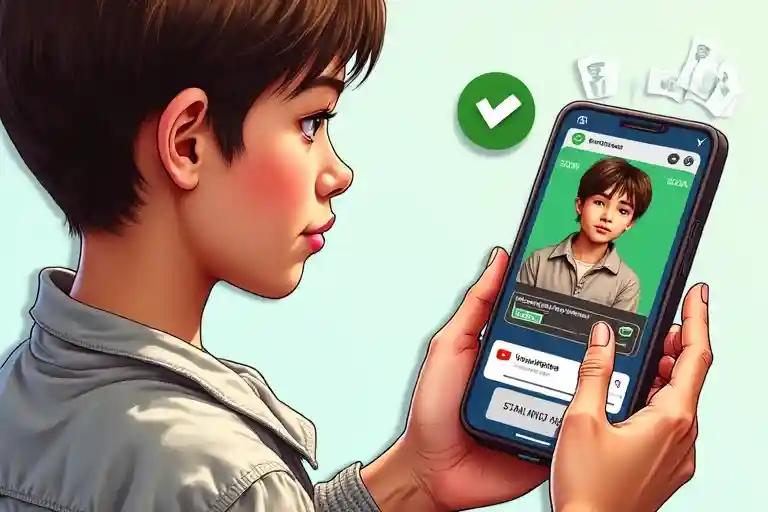Last updated: June 2025
Alright, let’s dive RIGHT in! You’re probably scrolling through TikTok, see someone flexing their online earnings, and think, “Hey, I want a piece of that!” Maybe you’ve heard whispers about making money just by clicking ads? Well, you’ve landed in the perfect spot. We’re about to explore the world of the best paid per click sites, specifically for teens like YOU (yep, 13–18-year-olds, I’m looking at you!). Forget confusing grown-up talk; we’re gonna break it down, keep it real, and see if this is a legit way to stack some digital dollars for that new game, those concert tickets, or just extra snack money. We’ll look at how these PTC (Paid-to-Click) sites work, which ones are beginner-friendly, how to potentially level up your earnings (spoiler: it’s not *just* clicking!), and CRUCIALLY, how to dodge those scammy sites that are faker than a three-dollar bill. Plus, we’ll get into some real talk about whether it’s actually worth your precious screen time. (Can you believe some people spend hours for pennies? We’ll investigate!). So, buckle up, because we’re going on an adventure to find the best paid per click sites!
Pay per click sites make money online: The Real Deal for Teens
So, what’s the tea on these pay per click sites make money online? Imagine this: businesses want eyeballs on their advertisements, right? Instead of just hoping you notice their ad on a random internet site, they partner with PTC sites. These PTC platforms then pay you a tiny amount of money to, well, click on on and look at those advertisements for a specific amount of time – typically like five to 30 seconds. Think of it as getting a micro-fee for a micro-undertaking. It’s one of the only types of online earning available, which is why it regularly attracts beginners and, yup, young adults seeking out some starter coins. No heavy-obligation talents wished, just a chunk of time and an internet connection. But right here’s the actual speak: are we speaking “buy a brand new phone” cash or “perhaps an additional soda” money? Mostly the latter, in particular at first. The profits according to click on are generally fractions of a cent. I understand, I recognize, not precisely what those “get wealthy quick” films promise, huh? That’s like that meme wherein the expectancy is a mountain of cash, and truth is a few coins. It’s all approximately dealing with expectancies and understanding that whilst you can earn, it is normally a gradual grind. We’ll explore approaches to be smart approximately it in a while!
How do PTC sites actually work?
It’s pretty straightforward, that’s a massive plus! First, you sign on for a PTC internet site (we’re going to speak about locating proper ones). This typically simply requires an e mail and developing a password. IMPORTANT: If you’re under 18, usually, ALWAYS take a look at if the site permits customers your age and get your dad and mom’ permission. Seriously, do not pass this step – it is about staying safe on line. Once you’re in, you will see a listing of to be had advertisements. You click an advert, a brand new tab opens, and there is frequently a timer. You gotta stay on the web page until the timer hits zero. Sometimes there’s a simple captcha to prove you are a human and no longer a bot seeking to game the device. After the time is up and you’ve got verified you are not a robot trying to take over the arena (or just the advert sales), cha-ching! A tiny amount is credited on your account on the PTC web page. Keep doing this, and your stability slowly grows. Most sites have a minimal payout threshold, meaning you need to earn a certain quantity (like $2, $five, or $10) before you can cash out, regularly thru PayPal or every now and then present cards. It’s a numbers recreation; extra clicks equal more micro-cents piling up.
Are all PTC sites legit?
Oof, this is a big one. The short answer? No, definitely not. The online world, as awesome as it is for cat videos and connecting with friends, also has its shady corners. For every legit PTC site trying to do things right, there are, sadly, scammy ones. Some red flags include promising UNBELIEVABLY high earnings per click (like dollars per click – super sus!), asking you to pay a membership fee to access better ads (huge no-no for basic PTC), or having a super high payout threshold that’s almost impossible to reach. Imagine clicking for weeks only to find out you can’t get your money – total nightmare fuel! That’s why doing your homework, which we’ll cover, is key. Checking reviews and starting with well-known platforms is a good first step to figuring out if PTC sites are a legit way to earn online for you.
Best paid per click sites for beginners: Starting Your Click Journey
If you’re just dipping your toes into the world of online earning, finding the best paid per click sites for beginners is all about simplicity, reliability, and low payout thresholds. You don’t want to be overwhelmed with a complicated interface or wait forever to see your first few bucks. Think of it like starting a new video game on easy mode to get the hang of things! Look for sites that have been around for a while and have generally positive reviews (though always take reviews with a grain of salt and look for patterns). Some platforms also offer more than just clicking ads – they might have options for short surveys, simple online tasks, or even watching videos for points that convert to cash. This can make the experience a bit more varied and potentially speed up your earnings, even if just a little. The key for beginners is not to get discouraged by the low initial earnings but to learn the ropes and understand how these platforms operate. It’s also a good way to practice online safety habits!
What to look for in a beginner-friendly PTC site
Okay, new adventurer, here’s your checklist! First, a clean and easy-to-understand website. If it looks like it was designed in 1998 and is full of flashing banners, maybe proceed with caution. Second, clear terms of service, especially regarding age limits and how you get paid. If you can’t find this info easily, that’s a bit of a red flag. Third, look for a low minimum payout. It’s way more motivating to cash out $2 or $5 relatively quickly than to aim for a $20 target that feels lightyears away. Fourth, multiple payment options are a plus – PayPal is common, but some offer gift cards to places like Amazon, which can be cool. And finally, check if they have an active forum or support system. This can be a good sign that the site is maintained and cares about its users. Remember, even the best paid per click sites won’t make you rich overnight, but a good beginner site makes the process smoother.
A few names often mentioned (Do your OWN research!)
While I can’t *endorse* specific sites (because things change SO fast online, and what’s good today might not be tomorrow), you’ll often see names like Neobux, ScarletClicks, or PrizeRebel mentioned in discussions about PTC and Get-Paid-To (GPT) sites. PrizeRebel, for example, is more of a GPT site that includes PTC ads among many other ways to earn, like surveys and offers. The key here is *do your own research*. Before signing up for ANY site, search for recent reviews (like, from the last few months). See what people are saying on forums or even on platforms like Reddit. Are people getting paid? Are there lots of complaints? This is a crucial step for finding the best PTC sites to earn money and avoid the duds. Think of it like checking the Rotten Tomatoes score before watching a movie – you want to know what you’re getting into!
Highest paying pay per click affiliate programs: Level Up Your Earnings?
Now we’re venturing into slightly different territory with “highest paying pay per click affiliate programs.” This isn’t *just* about you clicking on ads anymore. This is where you essentially become a promoter. Affiliate marketing, in general, is where you promote a product or service, and if someone signs up or buys something through your unique referral link, you get a commission. In the context of PTC sites, their “affiliate” or referral programs usually mean you earn a percentage of what the people you refer (your “referrals”) earn from clicking ads. So, if you refer a friend, and they start clicking and earning, you get a small bonus. It’s like getting a finders’ fee! Some PTC sites have quite structured referral programs, and this is often touted as the *real* way to make more than just pennies. However, “highest paying” is relative here. The percentages might be small, and your referrals need to be active. It’s not passive income in the sense that you do nothing; you have to actually get people to sign up AND use the site. What do you think – sound like something you’d be good at?
How do PTC referral programs work?
It’s pretty simple on the surface. When you join a PTC site, you’ll usually get a unique referral link. Your mission, should you choose to accept it (cue spy music!), is to share this link with others. Maybe you tell your friends, share it on a social media page (if allowed, always check rules!), or mention it on a blog if you have one. If someone clicks your link and signs up to the PTC site, they become your direct referral. Then, when *they* click ads and earn, the PTC site gives you a small percentage of their earnings as a bonus. This doesn’t take away from your referral’s earnings; it’s an extra payment from the site to you for bringing in a new user. Some sites even have multi-level referrals (you earn from your referrals’ referrals), but that can get complicated and sometimes leans towards less reputable models. Stick to understanding direct referral bonuses first. For those interested in ad click earn money websites, this can be a way to boost what you make.
Is it easy to make money with these?
Honestly? It’s tougher than it sounds. Getting people to sign up is one thing, but getting them to be *active* enough for you to earn a noticeable amount is the real challenge. Many people sign up for PTC sites, click for a day or two, realize it’s slow going, and then abandon their accounts. If your referrals aren’t clicking, you’re not earning from them. So, while it sounds cool to earn from others’ efforts, it requires you to be good at promoting and to find people who will actually stick with it. It’s not like that TikTok trend where something goes viral overnight with zero effort – this takes consistent effort. The “highest paying” ones might offer a better percentage, but if your referrals aren’t active, a high percentage of zero is still zero! It adds another layer to your PTC journey beyond just being one of the users of best paid per click sites.

Get paid per click on your link: Beyond Just Watching Ads
This phrase, “get paid per click on your link,” can mean a couple of things in the teen earning world. Primarily, in the context of PTC sites, it directly ties back to what we just talked about: referral links. You share your link, someone clicks it (and signs up/acts), and you have the *potential* to earn. However, there’s a broader world of “pay per click” that goes beyond PTC sites themselves. This is where things like URL shorteners that pay, or certain types of ad networks (if you had a popular blog or website, which is a bigger project), come into play. For most teens starting out, the PTC referral link is the most accessible version of getting “paid per click on your link.” It’s about leveraging your (small) network to try and boost those micro-earnings. It’s not about just passively having a link out there; you often need to actively share and promote it. This is where your social media savvy might actually come in handy – but always, always ethically and without spamming people! Nobody likes a spammer, right? That’s like being the person who only talks about themselves at a party – instant turn-off!
Using referral links effectively (and ethically!)
So you’ve got your referral link from one of the best paid per click sites. Now what? Don’t just blast it everywhere like a digital firehose! That’s a quick way to get ignored or even blocked. Think about where it makes sense to share it. Maybe you have a close group of friends also looking for simple ways to earn online? You could explain how it works (the good and the bad, be honest!) and then share your link. If you’re part of an online community or forum where it’s appropriate to discuss online earning (and they allow referral links – *always check the rules*), you might share it there with your honest experience. Transparency is key. Let people know it’s a referral link. Don’t pretend you’re sharing some secret hack to instant riches. People appreciate honesty. And *never* create fake accounts through your own link; that’s a fast track to getting your main account banned. Play fair, be cool.
Other (more advanced) ways to get paid per click
Beyond PTC referrals, if you ever decide to, say, start a blog that gets popular, or a YouTube channel, you might explore things like Google AdSense. With AdSense, you display ads on your content, and you can earn when people click those ads. This is a much bigger commitment and requires creating valuable content that attracts an audience. Another avenue, though less common for direct “pay per click” and more “pay per action,” is traditional affiliate marketing where you promote products from online stores. If someone clicks your affiliate link and buys a product, you get a commission. These are more advanced strategies and usually require a platform (like a blog or social channel with followers) and a deeper understanding of online marketing. For now, focusing on using PTC referral links smartly is a more realistic starting point if your main goal is related to best paid per click sites.
Amazon affiliate pay per click: Is It a Thing for PTC Fans?
When you see “Amazon affiliate pay per click,” it’s important to clarify something. Amazon’s main affiliate program, called Amazon Associates, is primarily a “pay-per-sale” program. This means you earn a commission when someone clicks your affiliate link *and then buys something* on Amazon within a certain timeframe (usually 24 hours). You don’t typically get paid just for the click itself in their standard program. So, if you’re thinking you can just plaster Amazon links everywhere and get paid for every single click like you do with ads on a PTC site, that’s not quite how Amazon Associates works. It’s more about driving actual sales. Now, could a PTC user also be an Amazon Associate? Sure, they are separate things. You could be clicking ads on a PTC site for micro-cents and also trying to earn commissions by promoting Amazon products on a blog or social media. The skills are different, though. PTC is about time and clicks; Amazon Associates is about influence, trust, and marketing to encourage a purchase. It’s like comparing playing a casual mobile game to trying to become a pro esports player – different levels of strategy and commitment!
Understanding Amazon Associates (it’s mostly pay-per-SALE)
Let’s be super clear: Amazon Associates is powerful, and many people make good money with it. But it’s not a “paid per click” model in the way PTC ads are. When you join Amazon Associates (you’ll need to apply, and they have requirements, including often needing a website or established social media presence), you can create unique links to products on Amazon. If you write a blog post reviewing your favorite gaming headsets and someone clicks your link in that post and buys a headset (or anything else on Amazon during that session), you earn a percentage of that sale. The percentage varies by product category. It’s an amazing program if you have an audience and can genuinely recommend products. But it’s *not* about getting paid for the click itself. That’s a common misconception. Thinking this is like the best paid per click sites model will lead to disappointment.
Could PTC skills help with Amazon Associates?
This is an interesting question! While the core mechanisms are different (clicks vs. sales), some underlying soft skills *might* transfer. For example, patience! Both PTC earning and successful affiliate marketing require a LOT of patience. You won’t get rich quick with either. Also, if you get good at promoting your PTC referral links (ethically!), some of those persuasive communication skills could be adapted for writing product descriptions or recommendations for an Amazon Associates link. However, the strategy is very different. With PTC, it’s often a volume game. With Amazon Associates, it’s about targeted promotion and building trust so people act on your recommendations. It’s definitely a step up in complexity from just clicking ads, but it’s good to know about other paid to click websites earn concepts and related fields.
Spotting the Fakes: How to Avoid Scammy best paid per click sites
Okay, squad, this is SUPER important. The internet is awesome, but it’s also got its share of tricksters. When you’re looking for the best paid per click sites, you absolutely HAVE to know how to spot the scams. It’s like trying to find a legit designer bag at a flea market – you need a good eye! Losing your time is bad enough, but some scam sites might try to get personal info or even get you to pay for bogus “upgrades.” No one wants that drama. Imagine spending weeks clicking, thinking you’re about to cash out for that game you wanted, only to find the site vanishes or says you violated some non-existent rule. That’s the digital equivalent of a “Yoink!” meme where your earnings just disappear. Total letdown. According to insights from fraud detection services like those mentioned by ClickCease (which focuses on click fraud from an advertiser perspective, but highlights the deceptive nature of some PTC setups), many scam PTC sites rely on duping both users and advertisers. We want to be smart clickers, not duped ones!
Red Flags: Warning Signs of a Scam PTC
Here’s your scam-detector toolkit:
- Promises of High Earnings Per Click: If a site says you’ll earn $1, $5, or even $10 *per click* on a regular ad, RUN! Legit PTC sites pay fractions of a cent per click. High promises are almost always a lie.
- Registration Fees or Upgrade Costs to Earn Decently: While some legit sites have optional upgrades for referral limits etc., if a site *requires* you to pay money just to start earning or to cash out, that’s a massive red flag. You’re there to *earn* money, not spend it.
- No Information About the Company/Owners: If the “About Us” page is blank or super vague, or there’s no contact information beyond a generic email, be wary. Legit businesses usually have some transparency.
- Poor Website Design and Lots of Errors: A site riddled with typos, broken links, and a design that looks like it was made in 5 minutes can indicate a lack of professionalism and potentially a short-term scam operation.
- Unrealistic Payout Thresholds: If you need to earn $100 to cash out and you’re earning $0.001 per click… well, do the math. It’s designed so you likely give up before reaching it.
- Negative Reviews and Payment Proof Issues: Search for “[Site Name] review” or “[Site Name] payment proof.” If you see a lot of recent complaints about not getting paid, that’s a major warning. Be aware that some “payment proofs” can be faked.
- Cloned Scripts: Some scam sites use cheap, identical website scripts. If you notice several PTC sites look *exactly* the same but have different names, be very cautious.
Trust your gut! If something feels off about one of these supposed best paid per click sites, it probably is. There are plenty of fish in the sea, so don’t waste time on a sketchy one. And always, ALWAYS talk to a trusted adult or parent if you’re unsure about a website. This is where paidtoclick safe ways for teens to earn becomes so vital.
What to do if you suspect a scam
First off, stop using the site immediately. Don’t click any more ads, don’t try to “earn just a little more” to cash out. If you’ve given them any sensitive personal information (which you ideally shouldn’t have beyond a basic email for signup), monitor your accounts. If you used a common password (big no-no, use unique ones!), change it on other important sites. Unfortunately, if they owe you money, it’s often very hard to get it back from a scam PTC site, especially if they are based overseas. The best you can usually do is warn others by leaving honest reviews on forums or review sites (stick to facts). Consider it a lesson learned in spotting online scams – a skill that’s valuable far beyond just PTC sites.
Maximizing Your Micro-Pennies: Tips and Tricks for best paid per click sites
Alright, so you’ve found a few PTC sites that seem legit, you’re aware of the low earning potential per click, but you still want to make the most of it. How can you be smart about your time on these best paid per click sites? It’s not about finding “hacks” (those usually lead to bans), but about being efficient and consistent. Think of it like collecting items in a game – every little bit adds up, but there are smarter ways to gather resources. One key is not to put all your eggs in one basket. Maybe use 2-3 reputable sites rather than just one. This way, if one site has fewer ads one day, another might have more. Also, try to log in daily, as some sites offer daily checklist bonuses or have more ads at certain times. And hey, while you’re clicking, maybe you have a podcast on or some homework you can glance at (if you can truly multitask!). Just don’t let it *completely* take over your focus from more important things like school!
Smart Clicking Strategies (No Cheating!)
- Consistency is Key: Many sites reward regular activity. Even 15-30 minutes a day, consistently, can be more effective than sporadic long sessions.
- Utilize Browser Extensions (Carefully!): Some PTC users use specific browser extensions designed to help manage multiple PTC sites or alert them to new ads. However, BE VERY CAREFUL. Only use well-known, reputable extensions, as malicious ones could steal your login info or earnings. When in doubt, don’t use them.
- Focus on Reputable Sites: It’s better to earn slowly on a site that actually pays than to earn “fast” on a site that will scam you. Stick with sites that have a good track record of paying PTC sites earn cash.
- Do the Math on Offers: Sometimes, PTC sites have “offers” or “tasks” from third-party providers (like signing up for a newsletter or trying a game). Some of these might pay more than standard ad clicks. BUT, always read the terms. Is it worth the time and information you’re giving? Some might require a purchase, which defeats the purpose of free earning.
- Referrals (The Long Game): As we discussed, getting active referrals is the main way to significantly boost PTC earnings. If you’re comfortable and ethical about it, this can be a focus.
- Check for Bonuses: Some sites have activity bonuses, ad-grid games (like ClixGrid on some older sites, where you click on a picture grid for a chance to win a small prize), or loyalty rewards. Take advantage of these if they don’t require too much extra time for little return.
The Table of PTC Realities
Let’s get real with a quick comparison to help you decide if this is for you:
| Feature | Typical PTC Site Engagement | What to Look For (Teens) | Potential Earnings | Time Investment for $5-$10 |
|---|---|---|---|---|
| Clicking Ads | Viewing ads for 5-30 seconds each | Clear timer, reliable crediting | $0.0001 – $0.01 per ad (typically very low end) | Many hours, potentially weeks |
| Surveys/Tasks (if offered) | Answering questions, completing small online tasks | Fair time-to-reward ratio, reputable offer walls | $0.10 – $2.00+ per task (highly variable) | Faster than ads alone, but depends on availability & qualification |
| Referral Program | Sharing your link, others click/earn | Clear terms, decent & realistic percentage, active referrals needed | Small % of referrals’ earnings; potential grows with *active* referrals | Ongoing effort to recruit & motivate |
| Payout Threshold | Minimum amount to withdraw (e.g., $2, $5, $10) | Low threshold ($2-$5 ideal for beginners), reliable payment methods (PayPal, gift cards) | N/A (This is the goal) | Depends entirely on your activity and methods used |
| Safety & Legitimacy | Varies wildly; scams exist | Positive recent reviews, no upfront fees for basic earning, transparent ToS, parental consent if needed | Crucial for actually *getting* your earnings | Initial research time per site is vital |
This table should give you a clearer picture. As you can see, relying *only* on clicking ads on best paid per click sites is a very slow path. Diversifying with tasks or referrals (if you’re up for it) is often recommended by long-term users.
Are best paid per click sites Worth Your Screen Time? A Teen’s Honest Look
This is the million-dollar question (well, maybe the ten-dollar question in this case!). Are the best paid per click sites actually worth the time you invest, especially as a busy teen with school, homework, friends, and maybe even that new TikTok dance to learn? The honest answer is: it depends on your expectations and what else you could be doing with that time. If you’re expecting to get rich or even earn enough for significant purchases quickly, PTC sites are likely to be a disappointment. It’s not like that “Stonks” meme where your earnings graph goes straight up. It’s more like a very, very slow crawl. For a deeper dive into this, resources like the article Get Paid to Click Ads: Are PTC Sites Worth It? can offer additional perspectives on whether the time investment makes sense. Many find that the earnings are so minimal for the time spent that it’s simply not a good trade-off.
Pros and Cons for a Teenager
Let’s break it down, keeping it 100:
Potential Pros:
- Super Low Barrier to Entry: You don’t need special skills or a resume. If you can click a mouse and have internet, you can technically do it.
- Flexible (Sort Of): You can usually do it whenever you have a spare few minutes – waiting for the bus, during a boring ad break on TV (if you still watch those!).
- Learn About Online Earning Basics: It can be a (very) gentle introduction to the idea of making money online and understanding things like payment thresholds and online accounts.
- Sense of Accomplishment (Maybe): Cashing out even a few dollars that you earned yourself can feel good, especially if it’s your first time earning online.
Potential Cons:
- VERY Low Earnings: We’re talking pennies per hour for many. You might spend an hour clicking to earn less than you’d find in a couch cushion. Is that how you want to use your time?
- Can Be Mind-Numbingly Boring: Clicking ad after ad? It can get old, FAST. Like, “watching paint dry” levels of boring.
- Risk of Scams: As we’ve covered, you need to be careful. Wasting time is one thing; getting scammed is another.
- Opportunity Cost: This is a big one. The time you spend clicking for pennies could be spent learning a new skill (coding, graphic design, video editing – things that can earn WAY more), doing homework, exercising, or even just having fun with friends. What are you giving up?
- Referral Pressure: The main way to boost earnings is referrals, which can feel awkward or spammy if not done right.
Honestly, for many teens, the time could be better invested elsewhere unless you genuinely find it a chill, no-pressure way to earn a tiny bit of pocket money while doing something else passive. Don’t sacrifice your studies or actual valuable experiences for the sake of a few cents from the best paid per click sites.
Alternatives for Teens to Earn Online
If clicking ads sounds like a bit of a drag for tiny returns, what else is out there for teens? Loads, actually! Consider these:
- Online Surveys: Sites like Swagbucks (which also has PTC elements but is more known for surveys), Survey Junkie, or LifePoints pay you for your opinions. Still not riches, but often better pay per hour than PTC.
- Micro-task Websites: Platforms like Amazon Mechanical Turk (requires being 18 for most things, but good to know about) or Clickworker (check age limits) offer small tasks (data entry, image tagging, transcription) that can pay more than PTC.
- Freelancing Lite: Got a skill? Even as a teen? Maybe you’re good at designing simple graphics with Canva, writing, editing videos for TikTok, or managing social media for a very small local business. Platforms like Fiverr or Upwork (again, check age/parental consent rules – often 18+, but sometimes younger teens can with parental account management) could be an option, or even just offering services locally.
- Sell Things Online: Handmade crafts on Etsy (with parental help/account), old clothes on Depop or Poshmark, or even digital art.
- Gaming (if you’re REALLY good): Some teens earn through streaming, competitive gaming (very tough!), or creating gaming content. This is a long shot for most but an option for some.
The point is, the best paid per click sites are just *one* very small, very low-earning option in a vast ocean of online opportunities. Explore and see what fits your skills, interests, and earning goals better! Perhaps looking into best get paid to click sites will give you more ideas if you’re set on this model, but always weigh the alternatives.
Exploring the best paid per click sites can be an initial step into the world of online income, but it’s crucial to keep expectations realistic and prioritize safety. Remember, your time is valuable, especially as a teen. While these sites offer a seemingly easy way to earn, the financial returns are typically minimal for the effort involved. It’s often more beneficial to invest time in learning new skills or exploring other online avenues that offer better earning potential and personal growth. Stay curious, stay safe, and make informed choices about how you spend your online hours. And who knows, maybe you’ll discover the next big thing for teen entrepreneurs!

Conclusion
So, there you have it – the lowdown on the best paid per click sites for teens! We’ve covered what they are, how to (hopefully) find legit ones, the real talk on earnings (spoiler: it’s usually small change!), and the biggie: how to avoid getting scammed. We also touched on referral programs and whether this path is truly worth your valuable screen time compared to other online earning gigs. Remember, while PTC sites can be a super simple entry point to making a few cents, they’re rarely a fast track to big bucks. It’s more of a “slow and steady (maybe) wins a tiny race” kind of vibe. The key is to be realistic, stay safe (parents’ permission, people!), and always weigh if your time could be better spent learning a killer new skill or on other adventures.
What are your thoughts? Have you tried any best paid per click sites? Got any tips or funny stories? Drop a comment below – let’s chat! And if you found this helpful, why not share it with your friends or on your TikTok? You never know who else might be curious!
Keep Updated! The online earning world changes FAST. New platforms pop up, old ones fade, and rules can change. Bookmark zana.website and check back often for the latest scoop, updated lists, and new ways for teens to earn safely online. We’re always on the lookout for you!
Frequently Asked Questions
1. What is the best pay-per-click site?
The “best” pay-per-click site really depends on your definition! For teens, it means a site that’s legit, has a low payout threshold, clear terms, and respects age requirements (often needing parental consent). Look for sites with positive recent reviews and a history of paying users. No single site is universally “best” as earnings are generally low across the board for just clicking ads; some users prefer sites that also offer surveys or tasks.
2. What is the highest paying affiliate website?
For “highest paying,” in affiliate marketing, it’s less about one specific website and more about the program, product niche, and your ability to drive sales or leads. High-ticket items or services (like software or financial products) often offer larger commissions per sale, but are harder to promote. Amazon Associates is popular due to its vast product range, but individual commission rates vary and it’s pay-per-sale, not typically pay-per-click.
3. Can I earn from pay-per-click?
Yes, you *can* earn from pay-per-click sites, but it’s usually very small amounts of money for the time invested – think cents, not dollars, per hour just from clicking. The most significant earnings on PTC sites often come from referring other active users, rather than just your own clicks. It’s crucial to have realistic expectations and prioritize safety and legitimacy over promises of high returns.
4. What is the most popular PPC?
In the context of advertising platforms for businesses, Google Ads is by far the most popular Pay-Per-Click (PPC) advertising system. For individuals looking to *earn* via “paid to click” (PTC) sites by viewing ads, popularity varies and changes often. Sites like Neobux or Swagbucks (which is broader than just PTC) are frequently mentioned, but it’s vital to research current reviews and legitimacy before joining any platform.
5. Pay per click sites make money online?
Yes, pay per click sites are one way to attempt to make money online, but the earnings are typically very modest for the person doing the clicking. These sites act as intermediaries between advertisers and viewers. You get paid a tiny fraction for each ad you view. While it’s a simple method, it’s not a quick path to significant income and requires a lot of time for minimal returns.









